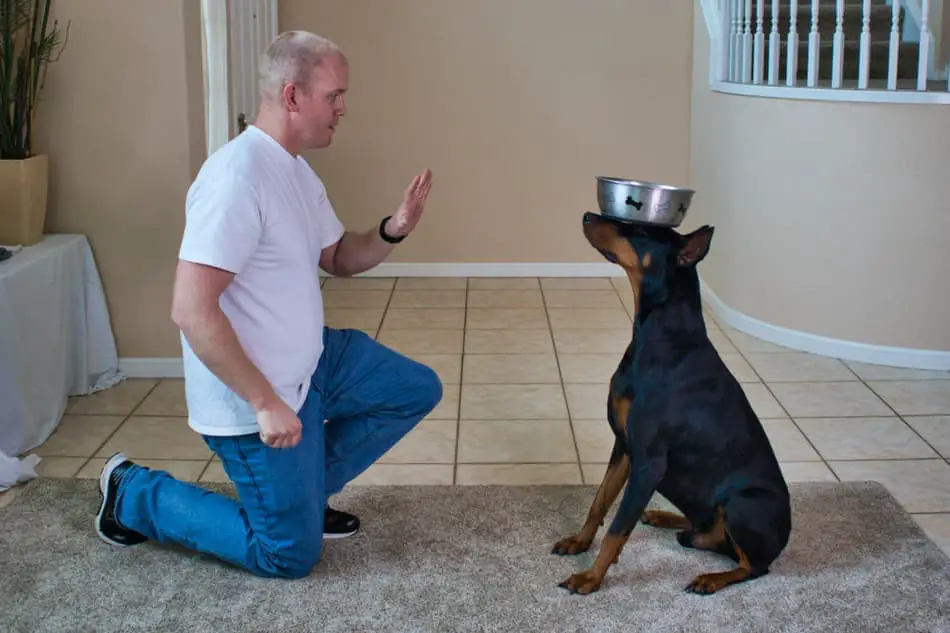Doberman Pinschers are an intelligent and loyal breed of dogs that require proper training to reach their full potential. However, not all Dobermans are the same, and therefore, they require unique training techniques tailored to their personality, temperament, and breed traits. In this blog, we will explore the concept of tailored training and discuss how it can be applied to Doberman Pinschers.
Understanding the Doberman Pinscher Breed
Before you can tailor your training techniques to your Doberman, it’s essential to understand the breed’s characteristics. The Doberman Pinscher is a relatively new breed that originated in Germany in the late 19th century. They were originally bred as guard dogs and have since become popular as companion dogs.
Physical Characteristics: The Doberman Pinscher is a medium to large breed of dog that typically weighs between 60-100 pounds. They have a sleek, muscular build, and their coat can be black, blue, fawn, or red. Their ears are naturally floppy but are often cropped for aesthetic purposes.
Temperament: Dobermans are known for their loyalty and intelligence. They are highly trainable and have a strong desire to please their owners. However, they can also be protective and territorial, making them excellent guard dogs.
Common Health Issues: Like all breeds of dogs, Dobermans are prone to certain health issues. Some of the most common health issues include hip dysplasia, von Willebrand’s disease (a blood disorder), and dilated cardiomyopathy (a heart condition).
Training Needs: Due to their intelligence and desire to please, Dobermans respond well to training. However, their protective and territorial nature can make them challenging to train in certain situations.
The Importance of Tailored Training
Every Doberman Pinscher is unique, and their training needs may vary based on their temperament, personality, and breed traits. Tailored training is critical to ensure that your Doberman receives the proper training that meets their specific needs.
Better Results: Tailored training ensures that your Doberman receives the proper training, resulting in better results. You’ll see faster progress and improved behavior when using techniques tailored to your Doberman’s needs.
Improved Behavior: Tailored training can help improve your Doberman’s behavior by addressing specific issues or challenges they may have. This can include aggression, anxiety, or other behavior problems.
Stronger Bond: Tailored training can also strengthen the bond between you and your Doberman. By understanding their specific needs and using techniques that work for them, you’ll build trust and create a stronger relationship.
Factors to Consider when Tailoring Your Doberman’s Training
To tailor your Doberman’s training, you need to consider several factors, including age, breed, temperament, personality, and any health issues.
Age: Your Doberman’s age will impact their training needs. Puppies will require more basic obedience training, while adult Dobermans may need more advanced training techniques.
Breed: The breed characteristics of Dobermans can impact their training needs. For example, their protective and territorial nature may require more socialization training.
Temperament: Dobermans can have varying temperaments, and their training needs may differ based on their personality. Some may be more anxious or aggressive and require specialized training techniques.
Personality: Just like people, every Doberman has a unique personality. Some may be more outgoing and social, while others may be more reserved and require a different approach to training.
Health Issues: Any health issues that your Doberman may have can impact their training needs. For example, a Doberman with hip dysplasia may require a modified training program to avoid causing pain or discomfort.
Customizing Your Doberman’s Training
Once you understand the factors that impact your Doberman’s training needs, you can begin customizing their training program.
1. Obedience Training:
Obedience training is essential for all dogs, and Dobermans are no exception. Basic obedience training should include commands such as sit, stay, come, and heel. However, the training techniques you use may need to be tailored to your Doberman’s age, breed, and temperament.
For example, if you have a puppy, you may need to use positive reinforcement techniques, such as treats or praise, to motivate them. Older Dobermans may require more advanced training techniques, such as leash training or off-leash training.
2. Socialization Training:
Dobermans can be protective and territorial, making socialization training critical to their overall development. Socialization training should begin as early as possible to help your Doberman become comfortable around other people and dogs.
The training techniques used for socialization may need to be tailored to your Doberman’s temperament and personality. For example, if your Doberman is more anxious, you may need to take a slower approach to socialization training and use desensitization techniques.
3. Aggression Training:
Dobermans can be prone to aggression, making aggression training a necessary part of their training program. Aggression training should only be conducted by a professional trainer who has experience working with aggressive dogs.
The training techniques used for aggression training may need to be tailored to your Doberman’s specific aggression issues. For example, if your Doberman is aggressive towards other dogs, you may need to use desensitization techniques to help them become more comfortable around other dogs.
4. Health-Related Training:
If your Doberman has any health issues, their training program may need to be modified to avoid causing pain or discomfort. For example, if your Doberman has hip dysplasia, you may need to avoid training exercises that put stress on their hips.
5. Advanced Training:
Advanced training techniques can help your Doberman reach their full potential. Advanced training can include agility training, obedience competitions, or protection training. However, the training techniques used for advanced training may need to be tailored to your Doberman’s age, breed, and temperament.
Training Tips for Doberman Pinschers
Here are some tips to help you tailor your Doberman’s training program:
Be Consistent:
Consistency is critical in training your Doberman. Make sure to use the same commands and training techniques each time you train your dog.
Use Positive Reinforcement:
Positive reinforcement techniques, such as treats or praise, can be effective in motivating your Doberman during training.
Be Patient:
Training takes time and patience, especially with Dobermans. It’s essential to remain patient and not become frustrated with your dog’s progress.
Hire a Professional:
If you’re struggling with training your Doberman, it may be beneficial to hire a professional trainer who has experience working with Dobermans.
Tailored training is critical for ensuring that your Doberman receives the proper training to reach their full potential. By understanding their age, breed, temperament, personality, and any health issues, you can customize their training program to meet their specific needs. Remember to be consistent, use positive reinforcement, and remain patient during the training process. With the right training techniques, your Doberman can become a well-behaved and loyal companion.









